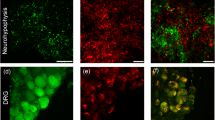Abstract
Behavioral changes after administration of the neurohypophyseal hormones vasopressin and oxytocin can be observed in animal and man. Several groups attempted to specify these changes in terms of memory or attention processing enhancement for vasopressin and amnesic properties for oxytocin. These interpretations, however, were targets for recent criticism. In a double-blind between-subject comparison with male volunteers receiving arginine-vasopressin (AVP), oxytocin or placebo intranasally prior to the experimental session, we tried to develop an alternative hypothesis on the basis of behavioral and EEG measures. At the beginning of the session subjects had to learn a list of 25 unrelated nouns within five trials. Recall was assessed 1 h later. Neither learning nor long-term recall were affected by peptide treatments. In a second vigilance task subjects had to covertly count eight series of tone pips. Averaged auditory evoked potentials to these tones showed the expected habituation during the course of the task within all three groups. Vasopressin-treated subjects, however, displayed significantly higher amplitudes of the vertex potential as compared to the other treatment groups. AVP effects were most prominent with the longest interstimulus interval. No influences on heart rate or blood pressure were found. Results indicate that vasopressin induces an enhancement of stimulus-related phasic cortical arousal, and that in this respect oxytocin has no effect.
Similar content being viewed by others
References
Baddeley AD (1976) The psychology of memory. Harper, New York
Beckwith BE, Till RE, Schneider V (1984) Vasopressin analog (DDAVP) improves memory in human males. Peptides 5:819–822
Beckwith BE, Petros TV, Bergloff PJ, Staebler RJ (1987) Vasopressin analogue (DDAVP) facilitates recall of narrative prose. Behav Neurosci 101 (3):429–432
Born J, Fehm-Wolfsdorf G, Lutzenberger W, Voigt KH, Fehm HL (1986) Vasopressin and electrophysiological signs of attention in man. Peptides 7:189–193
Butler RA (1968) Effect of changes in stimulus frequency and intensity on habituation of the human vertex potential. J Acoust Soc Am 44:945–950
de Wied D (1984) The importance of vasopressin in memory. Trends Neurosci 7 (3):62–64
de Wied D, Gaffori O, van Ree JM, De Jong W (1984) Central target for the behavioral effects of vasopressin neuropeptides. Nature 308:276–278
Ettenberg A, van der Kooy D, Le Moal M, Koob GF, Bloom FE (1983) Can aversive properties of (peripherally-injected) vasopressin account for its putative role in memory? Behav Brain Res 7:331–350
Fehm-Wolfsdorf G, Voigt KH, Fehm HL (1983) Human memory and lysin-vasopressin: a psychological study. In: Endröczi E, Angelucci L, de Wied D, Scapagnini U (eds) Neuropeptides and psychosomatic processes. Academia Kiado, Budapest, pp 81–88
Fehm-Wolfsdorf G, Born J, Voigt KH, Fehm HL (1984a) Behavioral effects of vasopressin. A single case study. Neuropsychobiology 11:49–53
Fehm-Wolfsdorf G, Born J, Voigt KH, Fehm HL (1984b) Human memory and neurohypophyseal hormones: opposite effects of vasopressin and oxytocin. Psychoneuroendocrinology 9:285–292
Fehm-Wolfsdorf G, Born J, Elbert T, Voigt KH, Fehm HL (1985) Vasopressin does not enhance memory processes: a study in human twins. Peptides 6:297–300
Gash DM, Thomas GJ (1983) What is the importance of vasopressin in memory processes? Trends Neurosci 6 (6):197–198
Le Moal M, Koob GG, Koda LY, Bloom FE, Manning M, Sawyer WH, Rivier J (1981) Vasopressor receptor antagonist prevents behavioral effects of vasopressin. Nature 291:491–493
Le Moal M, Dantzer R, Mormède P, Baduel A, Lebrun C, Ettenberg A, van der Kooy D, Wenger J, Deyo S, Koob GF, Bloom FE (1984) Behavioral effects of peripheral administration of arginine vasopressin: a review of our search for a mode of action and a hypothesis. Psychoneuroendocrinology 9 (4):319–341
Millar K, Jeffcoate WJ, Walder CP (1987) Vasopressin and memory: improvement in normal short-term recall and reduction of alcohol-induced amnesia. Psychol Med 17:335–341
Nebes RD, Reynolds CF, Horn LC (1984) The effect of vasopressin on memory in the healthy elderly. Psychiatry Res 11:49–59
Sahgal A (1984) A critique of the vasopressin-memory hypothesis. Psychopharmacology 83:215–228
Timsit-Berthier M, Mantanus H, Legros JJ (1983) EEG-reactivity and event related potential approach to the study of vasopressin. In: Angelucci L, de Wied D, Endroezi E, Scapagnini U (eds) Integrative neurohumoral mechanisms. Excerpta Int Med Congr Ser, pp 63–71
Author information
Authors and Affiliations
Rights and permissions
About this article
Cite this article
Fehm-Wolfsdorf, G., Bachholz, G., Born, J. et al. Vasopressin but not oxytocin enhances cortical arousal: an integrative hypothesis on behavioral effects of neurohypophyseal hormones. Psychopharmacology 94, 496–500 (1988). https://doi.org/10.1007/BF00212844
Received:
Revised:
Issue Date:
DOI: https://doi.org/10.1007/BF00212844




